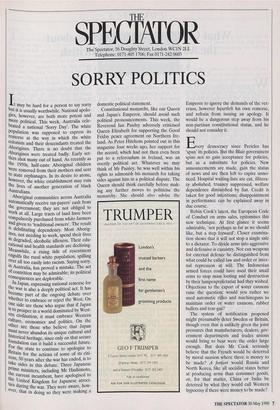SPECTATOR
The Spectator, 56 Doughty Street, London WCI N 2LL Telephone: 0171-405 1706; Fax 0171-242 0603
SORRY POLITICS
Aboriginal communities across Australia automatically receive tax-payers' cash from the government; they are not obliged to work at all. Large tracts of land have been Compulsorily purchased from white farmers and given to 'traditional owners'. The result is debilitating dependency. Most Aborig- ines, not needing to work, spend their lives In degraded, alcoholic idleness. Their edu- cational and health standards are declining. Meanwhile, a rising tide of resentment engulfs the rural white population, spilling over all too easily into racism. Saying sorry, in Australia, has proved a mistake. The act of contrition may be admirable; its political consequences are deplorable.
In Japan, expressing national remorse for the war is also a deeply political act. It has become part of the ongoing debate over whether to embrace or reject the West. On one side are those who argue that if Japan is to prosper in a world dominated by West- ern civilisation it must embrace Western culture, economics and politics. On the other are those who believe that Japan must never abandon its unique cultural and historical heritage, since only on that secure For can it build a successful future. r
„o.r the state to continue to apologise to Britain for the actions of some of its citi- zens, 50 years after the war has ended, is to tak. e sides in this debate. Three Japanese Prune ministers, including Mr Hashimoto, the current incumbent, have apologised to the United Kingdom for Japanese atroci- ties during the war. They were aware, how- ever, that in doing so they were making a
domestic political statement.
Constitutional monarchs, like our Queen and Japan's Emperor, should avoid such political pronouncements. This week, the Reverend Ian Paisley adversely criticised Queen Elizabeth for supporting the Good Friday peace agreement on Northern Ire- land. As Peter Hitchens pointed out in this magazine four weeks ago, her support for the accord, which had not then even been put to a referendum in Ireland, was an overtly political act. Whatever we may think of Mr Paisley, he was well within his rights to admonish his monarch for taking sides against him in a political dispute. The Queen should think carefully before mak- ing any further moves to politicise the monarchy. She should also advise the
Emperor to ignore the demands of the vet- erans, however heartfelt his own remorse, and refrain from issuing an apology. It would be a dangerous step away from his non-partisan constitutional status, and he should not consider it.
Every democracy since Pericles has `spun' its policies. But the Blair government spins not to gain acceptance for policies, but as a substitute for policies. New announcements are made, gain the status of news and are then left to expire unno- ticed. Hospital waiting-lists are cut, illitera- cy abolished, truancy suppressed, welfare dependence diminished by fiat. Credit is taken for good intentions; disappointment in performance can be explained away in due course.
Robin Cook's latest, the European Code of Conduct on arms sales, epitomises this new technique. At first glance it seems admirable, 'not perhaps as far as we should like, but a step forward'. Closer examina- tion shows that it will not stop a single sale to a dictator. To divide arms into aggressive and defensive is casuistry. Nor can weapons for external defence be distinguished from what could be called law and order or inter- nal repression at will. The Indonesian armed forces could have used their small arms to stop mass looting and destruction by their lumpenproletariat had they wished. Objections to the export of water cannons raise the question: would you rather we used automatic rifles and machineguns to maintain order or water cannons, rubber bullets and tear-gas?
The system of notification proposed might presumably deter Sweden or Britain, though even that is unlikely given the joint pressures that manufacturers, dealers, gov- ernment departments and trades unions would bring to bear were the order large enough. But does Mr Cook seriously believe that the French would be deterred by moral suasion where there is money to be made? A fortiori would Russia and North Korea, like all socialist states better at producing arms than consumer goods, or, for that matter, China or India be deterred by what they would call Western hypocrisy if there were money to be made?


































































 Previous page
Previous page